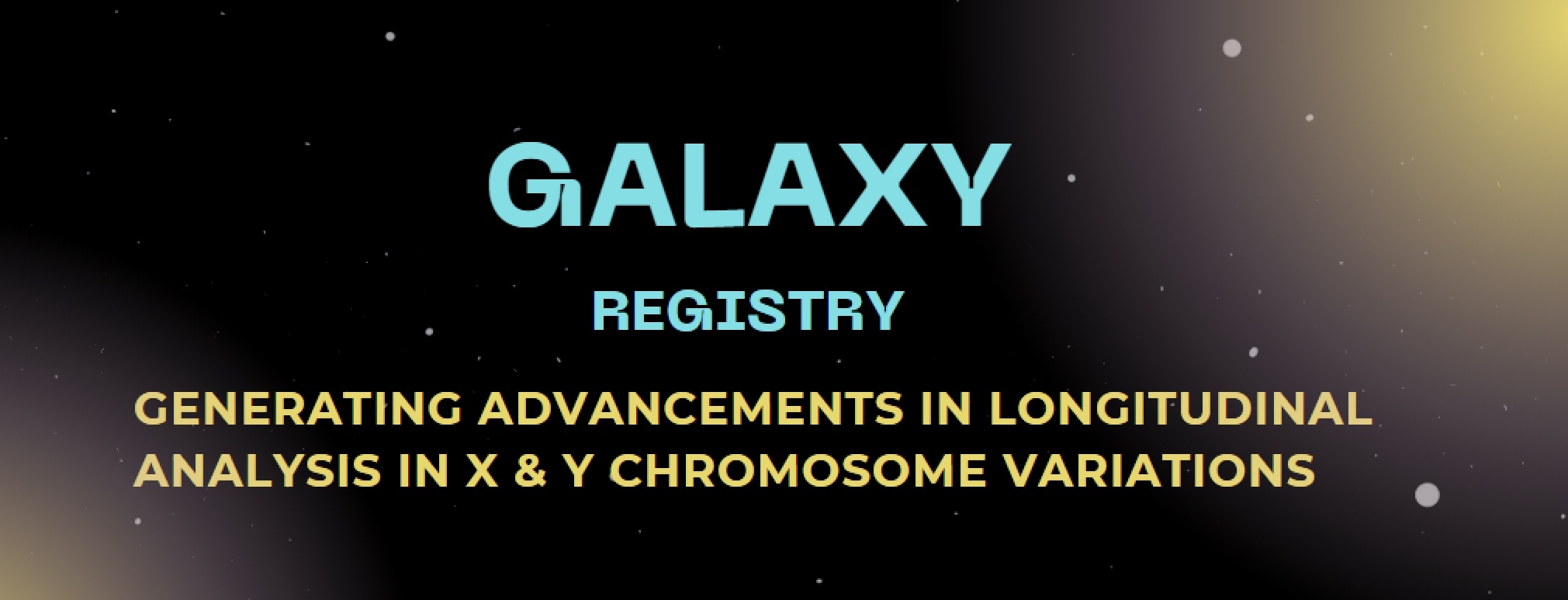GALAXY Registry: Generating Advancements in Longitudinal Analysis in X & Y Chromosome Variations

Purpose of the study: The purpose of the GALAXY Registry is to collect and store this information for individuals with X&Y variations. Since genetic differences like X&Y variations are rare, we need to get information from as many individuals as possible to draw the right conclusions. The GALAXY Steering Committee made up of doctors, researchers, and community advocates helps direct specific goals and how the data in the Registry can be used. Our overall goal is to be able to improve health outcomes in individuals with X&Y variations and the care they receive.
What’s Involved: If you join the study, you are allowing us to use information in your medical records for research. Additionally, you can complete questionnaires or join a recruitment list for future research but you can join the
registry without doing those as well.
To learn more about this study, contact 720-777-0705 or email [email protected]
(COMIRB# 20-0482, ; PI Dr. Shanlee Davis; funded in part by AXYS)
You can also enroll yourself/your child in the registry online without coming into clinic, click here for the eligibility and consent information.
The GALAXY Registry has a public data dashboard showing current enrollment information, demographics, and a breakdown of the different SCAs. Click here to see it!
GALAXY Steering Committee:
Lilian Cohen, MD, MPH – medical geneticist at Weill Cornell Medicine
Shanlee Davis, MD, PhD – pediatric endocrinologist at Children's Hospital Colorado / University of Colorado
Anna Dawczyk, PhD – lecturer in the Department of Sociology at the University of British Columbia
Gail Decker – XXYY Project Volunteer and AXYS Board Member
Steve Gerken – community representative
David Hong, MD – child and adolescent psychiatrist at Stanford Medicine
Susan Howell, MBA, MS, CGC – genetic counselor and clinic coordinator of the eXtraordinarY Kids Clinic Children's Hospital Colorado / University of Colorado
Armin Raznahan, MD, PhD – chief of the Section of Developmental Neurogeneomics at the National Institute of Mental Health
Alan Rogol, MD, PhD – professor emeritus of Pediatrics and Pharmacology at the University of Virginia
Nicole Tartaglia, MD – developmental pediatrician and Founder & Director of the eXtraordinarY Kids Clinic at Children's Hospital Colorado
Important documents:
Frequently Asked Questions:
Do I have to live in the US to be in GALAXY?
You do not have to live in the US to be in GALAXY!
If you live in a country governed by GDPR, you cannot join the study right now. If you're living in any other country, you are eligible to join. Countries governed by GDPR are:
Belgium Bulgaria Croatia Cyprus Czech Republic Denmark Estonia Finland France | Germany Greece Hungary Iceland Ireland Italy Latvia Liechtenstein Lithuania Luxembourg | Malta Netherlands Norway Poland Portugal Romania Slovakia Slovenia Spain Sweden United Kingdom |
Do I have to agree to the future studies list and questionnaires?
No you do not. These are completely optional and you can join the GALAXY registry without being on the future studies list or completing questionnaires.
What if I don't have the genetic test that shows I have an X&Y variation?
To be eligible for GALAXY, the study team does need to review the genetic test that confirmed you have a diagnosis of an X&Y variation. To do that, you can upload a copy of the lab report when you consent. However, you can also opt to sign a Release of Records instead - this allows the study team to reach out to the clinic where you had the test done at and we can get a copy that way instead.
I can't remember if I already signed up for GALAXY. How do I know?
Our team is excited to help you check if you’ve already joined the registry! Please send an email to [email protected] with your name and birthdate (or your child’s information). This will help us find your records. If you are a parent of an adult, we can only look up your child for you if you are their Legally Authorized Representative. If not, please have your child reach out to us directly.
Presentations
At the 2024 meeting of the Western Society for Pediatric Research (WSPR), Kayla Molison, student researcher, presented "Initial data from the GALAXY Registry: Generating Advancements in Longitudinal Analysis in X & Y Chromosome Variations." The purpose of the presentation was to understand who enrolled in the registry during the first 15 months of recruitment to help guide recruitment efforts. It was found that most participants were non-Hispanic White and about 20% were using Medicare or Medicaid insurance. The majority of participants had Klinefelter syndrome/47,XXY.